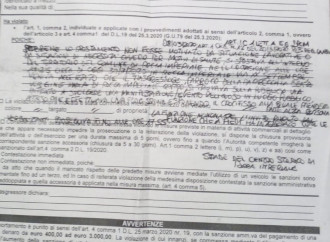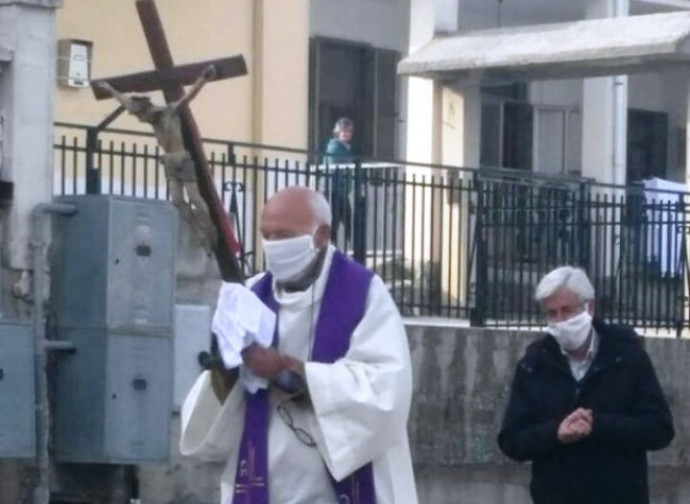The following translation is an exclusive interview that appeared in the weekend edition of the northern Italian daily La Nuova Bussola Quotidiana, which has fiercely defended Italy’s religious freedom throughout the ongoing coronavirus pandemic. Correspondent Andrea Zambrano interviewed a Roman Catholic parish priest, Rev. Domenico Cirigliano, who was slapped with a €400 fine by local police for processing with a “miraculous” crucifix. Rev. Cirigliano said he was performing essential “work” by blessing the town of Rocca Imperiale in order to save it from the outbreak of the coronavirus.
“The mayor ordered me to observe a 14-day quarantine,” he said after the incident. “But I won’t pay the fine. They want to punish the Church.”
Zambrano writes in his introduction:
The story is unbelievable, but it is nothing more than the natural continuation of the arbitrary limitations that having arisen during the COVID-19 emergency, from a literal application of government decrees which have severely limited [Italy’s] freedom of worship … In Rocca Imperiale, in the province of Cosenza, we have just witnessed the worst of this.
Zambrano notes, “It was precisely in 1691 when the crucifix” that Rev. Cirigliano carried “shed blood. And because of this miraculous wood, the crucifix is processed each March 30 through the main streets of the town.”
Below is the full interview between Zambrano and FRev Cirigilano who leads off by saying, “There is no way I’ll pay that fine.”
Zambrano: Fr. Domenico, what do you mean you won’t pay it?
Cirigliano: I won’t pay for it. Period. I didn’t even sign the police report for this reason.
Zambrano: Why?
Cirigliano: Because it is only a way to punish the Church.
Zambrano: Did you inform your bishop?
Cirigliano: Yes, I did.
Zambrano: So, what did he say?
Cirigliano: That he will call the mayor.
Zambrano: What for?
Cirigliano: Because the mayor notified me of a report prohibiting me from leaving home for 14 days.
Zambrano: Let’s review what happened step by step.
Cirigliano: OK.
Zambrano: So, it all started on March 30 …
Cirigliano: Exactly. Not being able to conduct the annual procession–which we had done without interruption for three straight centuries–I told our parishioners to know that I would pass through the main streets … blessing [them] with the crucifix.
Zambrano: And what did parishioners say?
Cirigliano: The young parishioners helped me spread the word on Whatsapp, and a lot of excitement was created. People were happy. They opened the windows and doors of their homes to watch.
Zambrano: And then what happened?
Cirigliano: At noon on March 30, a boy from the parish telephoned me to report that a “policeman” (an officer whom he called policeman “V”) “said not to go on with the procession.”
Zambrano: Who was officer “V”?
Cirigliano: A local officer. However, I explained that it was not a [public] procession. I was alone. There was only one parishioner with me, [following] at a distance with his mask on. The purposed [of the procession] was to protect our town from the coronavirus. I don’t care [what they say otherwise].
Zambrano: What happened?
Cirigliano: Well, around 5 p.m., I went outside [to process], and I was met by two carabinieri officers, who asked me for my papers.
Zambrano: What did you say?
Cirigliano: I said that my hands were occupied, because I was holding the crucifix. I couldn’t just lay it on the ground. “Take them yourself,” I said. And they rummaged through my pockets.
Zambrano: Then what happened?
Cirigliano: So, I carried on with the procession. People greeted the crucifix from afar. Some people got emotional, others blew kisses and prayed. I was tired, but the experience was moving. All went well, except on my way back …
Zambrano: What happened?
Cirigliano: The carabinieri police officers were still standing in front of my church. They were waiting for me to return my ID card and notify me of the charges they filed.
Zambrano: For 400 euros?
Cirigliano: Yeah, but I won’t pay it. I didn’t even sign their report, which they left on the church table.
Zambrano: What did the report say?
 Cirigliano: I will read it to you. “Your movement was not for reasons of work, necessity, or health within the territory of the city of Rocca Imperiale. At 5:25 p.m. today [March 30th] in Rocca Imperiale you were found on Via XX Settembre [right next to the church]. You are charged with violating [quarantine] on public streets for the purposes of holding a demonstration/religious event in a public place. You carried out a procession while holding up a crucifix, and another person took part in it. The procession … continued until 17.55 [5:55 p.m.], throughout all the streets of the historic center of Rocca Imperiale.”
Cirigliano: I will read it to you. “Your movement was not for reasons of work, necessity, or health within the territory of the city of Rocca Imperiale. At 5:25 p.m. today [March 30th] in Rocca Imperiale you were found on Via XX Settembre [right next to the church]. You are charged with violating [quarantine] on public streets for the purposes of holding a demonstration/religious event in a public place. You carried out a procession while holding up a crucifix, and another person took part in it. The procession … continued until 17.55 [5:55 p.m.], throughout all the streets of the historic center of Rocca Imperiale.”
Zambrano: How can this be a violation? Isn’t your sacred ministry considered your work, as defined by the Ministry of the Interior? Don’t you think that this report appears illegitimate?
Cirigliano: What do you want me to say?
Zambrano: And what about other processions [in Italy] then? Isn’t it true … that many priests have gone out into the streets to process with the Blessed Sacrament? In the town of Bibione, a parish priest loaded up a statue of the Madonna [and processed] with the both the mayor’s and local police’s approval. Why wasn’t he apprehended and fined? ….
Cirigliano: Look, I don’t know. Here, everyone interprets the law as he or she wishes. ….
Zambrano: You already said you won’t pay the fine, but will you do something to restore your right to worship?
Cirigliano: For now, let’s accept this as a trial sent by our Lord. Then, let’s see what the bishop will be able to do. Even so, I am very bitter. I processed with the crucifix to bless the whole city, to bless all the inhabitants of Rocca Imperiale, including the carabinieri police and the mayor. It is the crucifix that must protect us. Instead, they make it seem that this was a personal matter. … I do not find this to be fair or respectful of a minister of God.
(Photo credit: All images courtesy of La Nuova Bussola Quotidiana.)

